
Hegel
Studies in Continental Thought
EDITOR
JOHN SALLIS
CONSULTING EDITORS
Robert Bernasconi
John D. Caputo
David Carr
Edward S. Casey
David Farrell Krell
Lenore Langsdorf
James Risser
Dennis J. Schmidt
Calvin O. Schrag
Charles E. Scott
Daniela Vallega-Neu
David Wood
Martin Heidegger
Hegel
1. NEGATIVITY. A CONFRONTATION WITH HEGEL APPROACHED FROM NEGATIVITY (193839, 1941)
2. ELUCIDATION OF THE INTRODUCTION TO HEGELS PHENOMENOLOGY OF SPIRIT (1942)
Translated by
Joseph Arel and Niels Feuerhahn
Indiana University Press
Bloomington and Indianapolis
This book is a publication of
Indiana University Press
Office of Scholarly Publishing
Herman B Wells Library 350
1320 East 10th Street
Bloomington, Indiana 47405 USA
iupress.indiana.edu
Published in German as Martin Heidegger Gesamtausgabe 68: Hegel: 1. Die Negativitt. Eine Auseinandersetzung mit Hegel aus dem Ansatz in der Negativitt (1938/39, 1941); 2. Erluterung der Einleitung zu Hegels Phnomenologie des Geistes (1942), ed. Ingrid Schler
2009 by Vittorio Klostermann GmbH, Frankfurt am Main
English Translation 2015 by Indiana University Press
All rights reserved
No part of this book may be reproduced or utilized in any form or by any means, electronic or mechanical, including photocopying and recording, or by any information storage and retrieval system, without permission in writing from the publisher. The Association of American University Presses Resolution on Permissions constitutes the only exception to this prohibition.
 The paper used in this publication meets the minimum requirements of the American National Standard for Information SciencesPermanence of Paper for Printed Library Materials, ANSI Z39.481992.
The paper used in this publication meets the minimum requirements of the American National Standard for Information SciencesPermanence of Paper for Printed Library Materials, ANSI Z39.481992.
Manufactured in the United States of America
Library of Congress Cataloging-in-Publication Data
Heidegger, Martin, 18891976.
[Works. Selections English]
Hegel / Martin Heidegger ; translated by Joseph Arel and Niels Feuerhahn.
pages cm. (Studies in continental thought)
Includes bibliographical references.
ISBN 978-0-253-01757-4 (hardback : alk. paper) ISBN 978-0-253-01778-9 (ebook) 1. Negativity (Philosophy) 2. Hegel, Georg Wilhelm Friedrich, 17701831. Phnomenologie des Geistes. I. Heidegger, Martin, 18891976. Negativitt. English. II. Heidegger, Martin, 18891976. Erluterung der Einleitung zu Hegels Phnomenologie des Geistes. English. III. Title.
B3279.H48N4413 2015
193dc23
2015008173
1 2 3 4 5 20 19 18 17 16 15
CONTENTS
Translators Introduction
This is a translation of Martin Heideggers Hegel, which was originally published in German as volume 68 of Heideggers Gesamtausgabe in 1993. This volume comprises two different works: The first, shorter part of the volume has the original title of Die Negativitt. Eine Auseinandersetzung mit Hegel aus dem Ansatz in der Negativitt (193839, 1941). The second part bears the title Erluterung der Einleitung zu Hegels Phnomenologie des Geistes(1942). Though the text, especially the first part, is fragmentary and much less polished than many of his other texts, Heidegger seems to have considered it especially important. As the editor of the German original notes, it was Heidegger himself who grouped the two treatises together and assigned them to a special volume on Hegel. It was also Heidegger himself who assigned both treatises to the third division of the Gesamtausgabe. At the time of its publication it was the second volume to come out under the third division of the Gesamtausgabe: Unpublished Treatises: AddressesPonderings. The first volume to appear under this division was Beitrge zur Philosophie (Vom Ereignis), whose first edition was published in 1989.
In addition to giving some priority to these texts in the organization of his works, Heidegger also explains Hegels importance quite explicitly. Early on in the first part, he writes, The singularity of Hegels philosophy consists primarily in the fact that there is no longer a higher standpoint of self-consciousness of spirit beyond it. Thus any future, still higher standpoint over against it, which would be superordinate to Hegels systemin the manner by which Hegels philosophy for its part and in accord with its point of view had to subordinate every previous philosophyis once and for all impossible (p.3). Though Heideggers writing and lectures on Hegel, as well as on the German Idealism of Fichte and Schelling, increased significantly during the period in which this volume takes place, his insistence on Hegels importance is not new. Many years earlier, in 1915, Heidegger writes that Hegels philosophy contains the system of a historical worldview which is most powerful with regard to its fullness, its depth, its conceptuality, and the richness of its experiences, and which as such has removed and surpassed all preceding fundamental philosophical problems. It is the task of philosophy, he continues, to confront Hegel.
As the presence of direct addresses to an audience that can be found in both parts of Hegel indicates, the occasion for the composition of both treatises was likely their oral presentation to an audience. As the editor of the German original explains in her afterword, Heidegger may have presented or at least intended to present both treatises to a (small) circle of colleagues. Given the fragmentary and sketch-like character of Negativity, it is unclear whether Heidegger ever presented the reflections on Hegels negativity in the form in which they can be found in Negativity. The specificity of the address at the beginning of Negativity, where Heidegger told his audience that the discussion of Hegels negativity should not interrupt the course of your work of interpreting Hegels Logic (p.3) suggests that Heidegger had a particular audience in mind when he composed Negativity, even if he never actually presented his reflections to this audience.
Aside from the difference in length, one striking difference between parts one and two of Hegel is the difference in style and in their respective degree of elaboration of the two treatises. The first part contains at times an elliptical and fragmentary style. As the German editor notes, this fragmentary and sketch-like style character of much of Negativity gives the reader an insight into the process of Heideggers questioning and thinking. The second part, in contrast, displays a much greater degree of elaboration and stylistic cohesion. The differences between the two parts in terms of the respective arrangement of the material are equally striking. After a preliminary consideration, the second part follows the structure of the Introduction of the Phenomenology of Spirit. The first part, in contrast, does not have a comparable linear structure. Its first section, titled Negativity. Nothingabyssbeyng comprises thirty-four pages in the German original and is longer than the other four sections combined. The significant length and the comprehensiveness of the material treated suggest a certain priority of this section. The next three sections do not go beyond the ideas found in the first section, but rather elaborate some of the ideas found therein, while the central ideas of the final section, titled Hegel, seem to have already been incorporated into the first section. This could suggest that the remarks of this section served as the basis for the more elaborated articulation that constitutes the beginning of the first section of Negativity.
Next page

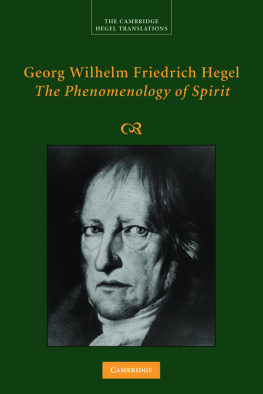
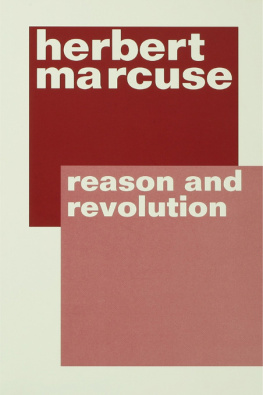
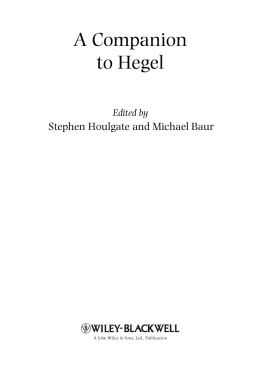


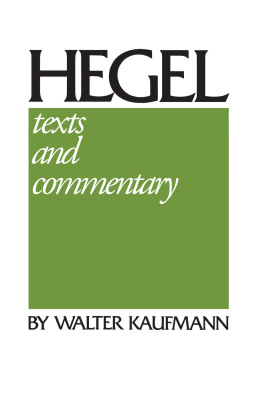
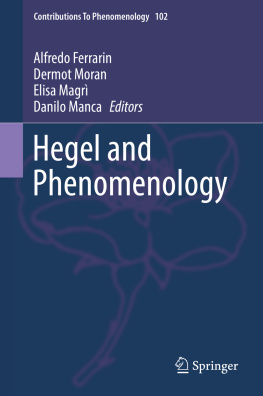
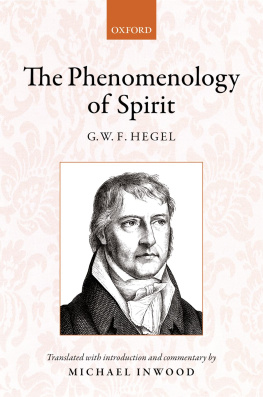
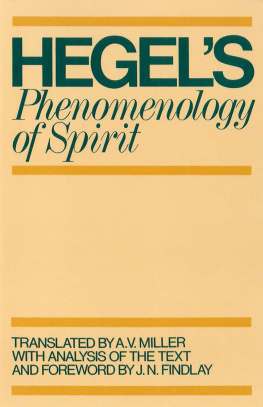

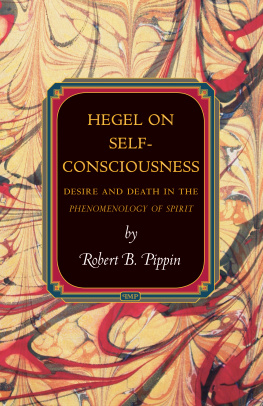


 The paper used in this publication meets the minimum requirements of the American National Standard for Information SciencesPermanence of Paper for Printed Library Materials, ANSI Z39.481992.
The paper used in this publication meets the minimum requirements of the American National Standard for Information SciencesPermanence of Paper for Printed Library Materials, ANSI Z39.481992.